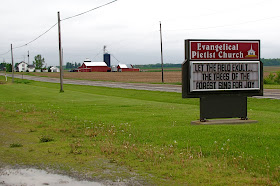



I’m just back from a two-lane road trip to central Ohio, and spring was making an Ireland of the buckeye state.
For fellow blue highway travelers, let me recommend north-south Routes 19 and 314 (connected by 224) from Magee Marsh to Sparta. It’s a stretch of two-lane, rural, understated beauty and mostly gentle curves—not a city to be seen or smelled, except for the short, harmless tacky-strip in Willard.
The parallel to that is Routes 61 and 4, which are also excellent, though construction on Rt. 4 could become a problem over the summer. Rt. 61 takes you through Galion, not a tiny town, but a pleasant one.
As for poetry, what I said about cummings yesterday is also true of Dylan Thomas, though I don’t think serious readers are quite as embarrassed to have found the Welshman important to them.
To be sure, Thomas is self-indulgent and redundant as he wallows in the wonders of nature, but I don’t think many would call him a philosophical simpleton, unless they’d say the same of Wordsworth. Also, who can fail to love the richness of the images in “Fern Hill,” even in its excesses?
Fern Hill - Poets.org - Poetry, Poems, Bios & More
And who would dare to claim immunity to that conclusion? If you haven’t at least tried to sing in your chains, why are you still sitting here, bothering us, stealing our oxygen?
* *
He hasn't quite written the textbook on elegant run-ons, inversion, and not-quite-regimented meter, but he's come close. It's a rose-colored portrait, in a sense, but acknowledges itself as such, the glowing fondness only achieved through age and distance but no less real for it. Somehow the synesthesia redeems any possible sentimentality for me: false nostalgia usually ends up monosensory, somehow.
ReplyDeleteP.S. I love cummings, and I'm not afraid to admit it. It's his endless bad imitators that embarrass.
Barbaro, you've really thought about this! I can't agree or disagree unless/until I re-read some more Thomas. Your points on syneshesia and false nostalgia are intriguing.
ReplyDeleteBut I'll add that I've always liked (loved?) Thomas' "Poem in October" and "The Force . . . ."
ReplyDeleteWith Dylan, I think it was always "the voice." I didn't care what he said particularly, I just wanted to revel in that rich, fruity voice. It was only of secondary importance to understand "Go not gentle into that dark night." The primary joy was hearing Dylan pronounce the words on those old Caedmon records. Sometimes just before I go to sleep at night, I practice saying, "standing in the back yard singing like a big-bosomed thrush."
ReplyDeleteThe imagery in this poem is rich. How can one long poem repeat images without repeating words? Maybe some of us adults are still pure children at heart.
ReplyDeleteAnd back roads take us on multiple journeys...
Gary, good point and thanks. You caused me to add a Saturday post(ina), which I usually avoid, assuming nobody reads on the weekends.
ReplyDeleteSpeaking of "the voice," I intend to get up a video or audio of young Ilya Kaminsky, the Russian immigrant who writes in English but reads in the old Russian style (an operatic chant, if those are the right words). Also, he lost his hearing at a very young age, so he's writing and reading aloud in a language he's never heard. Remarkable.
Brenda, absolutely, on all counts.
ReplyDelete